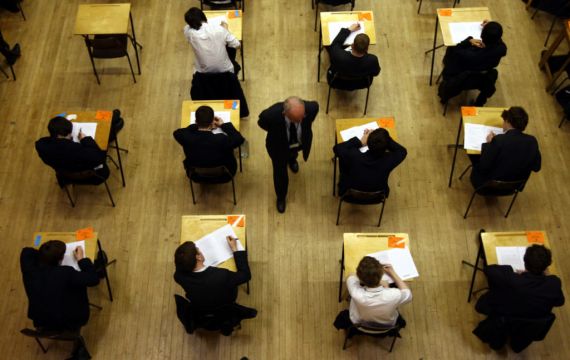An additional 18 deaths with Covid-19 have been reported in Northern Ireland on Tuesday.
Meanwhile, a further 1,378 people have tested positive for the virus.
There are a total of 577 Covid-confirmed inpatients in hospitals across the region, including 45 people currently in intensive care.
First Minister Arlene Foster indicated on Monday evening that a period of remote learning for schoolchildren in the North will be extended amid soaring case numbers.
The Stormont Executive is set to discuss further details of the proposal in a meeting on Tuesday.
With 12,507 fresh diagnoses of Covid-19 over the last seven days, ministers are also expected to order people to stay at home to stop the spread of the virus.
Tests cancelled
It comes as post-primary transfer tests planned for January have been cancelled in the region amid continued high levels of infection.
Private companies AQE and PPTC, which run the tests, made the announcement on Tuesday.
Earlier, the board of AQE took the decision not to proceed with transfer tests planned to take place this Saturday, as well as January 16th and January 23rd.
“The board will now be consulting with member schools, and a further statement will be issued after that,” it said in a statement on its website.
PPTC has also announced that it “will not provide an entrance assessment for 2020-21”.
Children’s Commissioner Koulla Yiasouma, along with Deputy First Minister Michelle O’Neill, Stormont Education Committee chairman Chris Lyttle (Alliance) and SDLP MLA Daniel McCrossan had pressed for the tests to be cancelled.
However, some parents have said it is too late to cancel the tests, which have already been delayed from autumn when they are normally sat.
There are parents who are very concerned that if their child doesn’t get the opportunity to sit the test, then they are going to be disadvantaged
Advertisement
Naomi McBurney, who runs the campaign Bring It Back To Primary, said parents are very divided on the matter.

“There are parents who are very concerned that if their child doesn’t get the opportunity to sit the test, then they are going to be disadvantaged; for example, if they have an eldest child or only child, the main thing for them would be that the test was a more fair way for them to get access to a school that they want to go to,” she said.
“The problem is the alternative criteria for schools isn’t transparent as yet. The 12 schools that said they would cancel the test back in June have indicated that it would be sub criteria – so if you had a child already at the school, or if you have a parent that had previously attended the school or a member of the family on the board of governors – similar to that of nurseries, not based on academic criteria.”
Ms McBurney has been running a campaign which urges that children be allowed to sit the transfer test in their own school, instead of having to travel to a large testing centre.
She has also called for reform of the system, with testing regulated by the Department of Education and reduced from children potentially sitting up to five papers if they take both the AQE and PPTC tests, to one.







